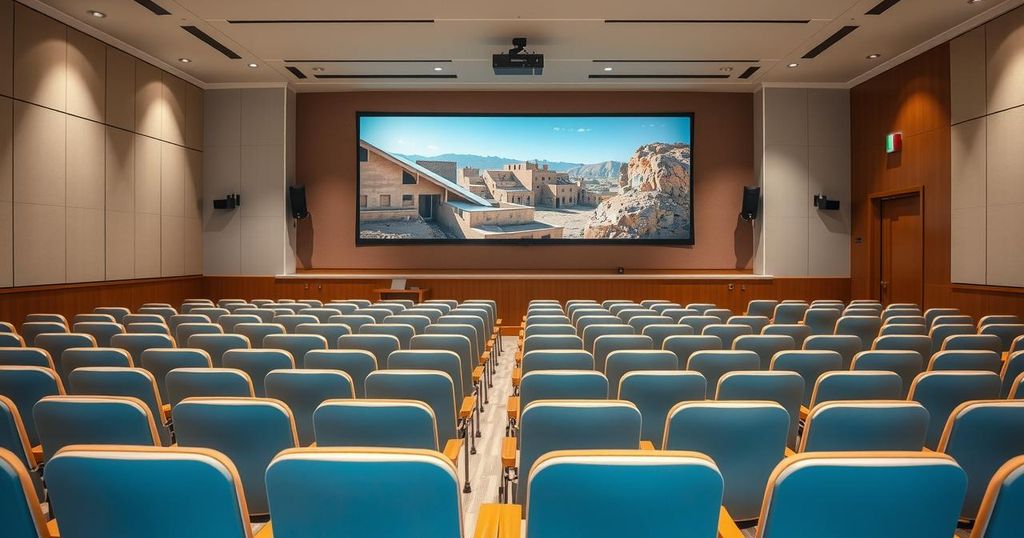World news
ABD, ABDALMAJID KATRANJI, AHMED AL - SHARAA, ASIA, ASSAD, ATLANTIC COUNCIL, CIVIL WAR, CONFLICT, HAY, HELMETS, HUMANITARIAN CRISIS, IDLBI, IDLIB, MICHIGAN, MICHIGAN STATE UNIVERSITY, MIDDLE EAST, REFUGEE CRISIS, SYRIA, TAHRIR AL - SHAM, UNIVERSITY OF MICHIGAN, WAR
Oliver Grayson
0 Comments
Weiser Diplomacy Center Insight on Syria’s Reconstruction Challenges
The Weiser Diplomacy Center hosted a talk addressing reconstruction in Syria, featuring Qutaiba Idlbi and Dr. Abdalmajid Katranji. They discussed the aftermath of the civil war, the challenges faced, and the new governance under Ahmed al-Sharaa. Their insights highlighted the resilience of Syrians and the importance of international support while emphasizing the creation of self-governing institutions during the conflict.
The Weiser Diplomacy Center at the University of Michigan hosted a discussion on post-civil war reconstruction in Syria, featuring Qutaiba Idlbi of the Atlantic Council and Dr. Abdalmajid Katranji from Michigan State University. The session examined Syria’s 14-year civil war, the strategies of the new Syrian government, and the various hurdles faced during the reconstruction efforts.
Following the regime collapse of Bashar al-Assad on December 8, 2024, Ahmed al-Sharaa emerged as the new leader, having previously headed the Hay’at Tahrir al-Sham group in Idlib. Overcoming devastation from the civil war is essential, as many educated Syrians have departed the country, leading to a significant brain drain, as highlighted by Idlbi.
Reflecting on the current situation, Idlbi emphasized that, regardless of the hardships, Syrians express relief at gaining freedom from the oppressive rule of Assad. Despite observing hardship, he noted the prevailing sentiment of joy among the civilians now that they have reclaimed their homeland.
Idlbi and Katranji defended Sharaa against Western criticisms concerning his past affiliations with Al-Qaeda, asserting that he has severed these ties and has actively opposed both Al-Qaeda and ISIS. Katranji shared insights from his humanitarian relief work in Idlib, which he contrasted sharply with the lack of governance in areas controlled by Assad.
Katranji recounted experiences wherein aid efforts were hampered due to the absence of organized structures under Assad’s regime, contrasting this with the proactive civic engagement he observed in Idlib. He argued that despite the civil war’s destructive effects, it allowed Syrians the opportunity to build self-governing institutions absent during Assad’s regime.
Idlbi suggested that while the extended conflict caused immense suffering, it also provided space for Syrians to shape their governance. He stressed that, in contrast to the U.S. intervention in Iraq, Syrians are on the path to nation-building on their own terms.
Despite recognizing past U.S. missteps in the region, Idlbi maintained that American involvement in Syria’s reconstruction can be constructive. He stated that the U.S. represents a powerful entity that could contribute positively without imposing its will.
Katranji discussed the implications of the U.S. sanctions on Syria, implemented under the Caesar Syria Civilian Protection Act. He criticized the continued sanctions post-Assad’s fall and urged that timely removal is essential to prevent further instability in the region, asserting that the international community’s consensus is shifting towards relaxation of these sanctions.
In a follow-up interview, Art & Design senior Razaan Killawi expressed her appreciation for the event, emphasizing the importance of student engagement on issues regarding Syria. She urged her peers to seek credible information from ground-level reporters to combat misinformation concerning the ongoing situation in Syria.
The discussions at the Weiser Diplomacy Center highlighted the complexities of post-civil war reconstruction in Syria, emphasizing the need for timely international support and the critical role of self-governing institutions formed during the conflict. Despite the challenges posed by historical governance failures and ongoing sanctions, the speakers underscored the resilience of the Syrian people and their commitment to rebuilding their nation. Engagement from students and the broader community is vital in fostering awareness and support for these reconstruction efforts.
Original Source: www.michigandaily.com




Post Comment